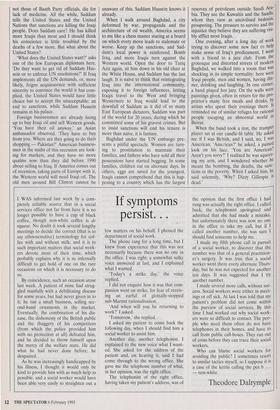If symptoms persist. . .
I WAS informed last week by a com- pletely reliable source that in a social services office not far from here it is no longer possible to have a cup of black coffee, though non-white coffee is de rigueur. No doubt it took several lengthy meetings to decide the correct (that is to say ethnosensitive) terminology for cof- fee with and without milk; and it is to such important matters that social work- ers devote most of their time, which probably explains why it is so infernally difficult to get hold of one on the rare occasions on which it is necessary to do so.
By coincidence, such an occasion arose last week. A patient of mine had strug- gled manfully with a debilitating disease for some years, but had never given in to it; he ran a small business, selling sec- ond-hand ornaments in the market. Eventually, the combination of his dis- ease, the dishonesty of the British public and the thuggery of his competitors (from which the police provided him with no protection at all) defeated him, and he decided to throw himself upon the mercy of the welfare state. He did what he had never done before: he despaired.
As he was increasingly handicapped by his illness, I thought it would only be kind to provide him with as much help as possible, and a social worker would have been able very easily to straighten out a few matters on his behalf. I phoned the department of social work.
The phone rang for a long time, but I knew from experience that this was not necessarily because there was no one in the office. I was right: a somewhat sulky voice answered at last, and I explained what I wanted.
`Today's a strike day,' the voice replied.
I did not enquire how it was that com- passion went on strike, for fear of receiv- ing an earful of glottally-stopped sub-Marxist rationalisation.
`And when will you be returning to work?' I asked.
`Tomorrow,' she replied.
I asked my patient to come back the following day, when I should find him a social worker to assist him.
Another day, another telephonist. I explained to the new voice what I want- ed. She asked for the address of the patient and, on hearing it, said I had come through to the wrong office. She gave me the telephone number of what, in her opinion, was the right office.
The telephonist of the right office, having taken my patient's address, was of the opinion that the first office I had rung was actually the right office. I called back; the telephonist apologised and admitted that she had made a mistake, but unfortunately there was now no one in the office to take my call, but if I called another number, she was sure I should find someone to help me.
I made my fifth phone call in pursuit of a social worker, to discover that the number was that of a general practition- er's surgery. It was true that a social worker went there every alternate Thurs- day, but he was not expected for another ten days. It was suggested that I try another number.
I made several more calls, without suc- cess. Social workers were either in meet- ings or off sick. At last I was told that my patient's problem did not come within the purview of social services. By this time I had worked out why social work- ers were so difficult to contact. The peo- ple who need them •often do not have telephones in their homes, and have to call from public call-boxes. They run out of coins before they can trace their social workers.
Who can blame social workers for avoiding the public? I sometimes resort to similar tactics myself, so I suppose it is a case of the kettle calling the pot b . - • — non-white.
Theodore Dalrymple






















































 Previous page
Previous page